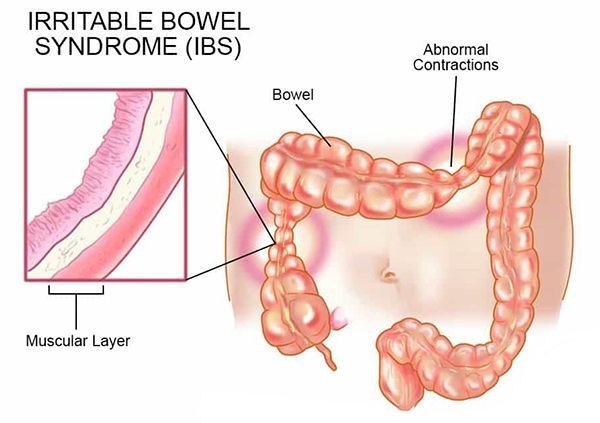Irritable bowel syndrome (IBS) consists of several symptoms. The most important symptoms of IBS are abdominal pain and abnormal bowel habits. Many patients with Irritable bowel syndrome get campy abdominal discomfort or pain, which comes and goes and is often relieved by emptying the bowels. The bowel habit is often irregular—sometimes diarrhea, sometimes constipation and quite often swinging between these two extremes. Some patients may notice they need to get to the bathroom in a hurry. Some patients present with abdominal fullness. Many patients notice that they lack energy and sleep poorly.
Irritable bowel syndrome is one of the most common disorders of the digestive system and up to one-third of the population experience symptoms from time to time. Women are slightly more affected than men and IBS is most often found in people under the age of 45. IBS is one of the most common reasons for patients to visit a doctor. In turn, it is also a very frequent reason for doctors to refer patients to a specialist in gastrointestinal disorders.
Causes of Irritable bowel syndrome (IBS)
Many reasons lead to the development of this condition. Some people notice IBS developing after they have had a bout of food poisoning or gastroenteritis. Some people believe that stress makes their symptoms worse. However, it appears likely that other causes, as of yet unknown, exist.
Types of IBS
Some IBS patients suffer mostly from constipation, some experience diarrhea, while others have both symptoms at different times.
Identifying these different types of IBS is important because treatments often work quite differently depending on whether diarrhea or constipation is the main problem. However, we do know that the pattern of bowel movements can alter over time and this means that your treatment might need to change should your symptoms vary.
Although the symptoms of IBS can be similar to those seen in more serious conditions, once IBS has been diagnosed there is no reason to think that it will develop into anything worse. In particular, patients with IBS are no more likely than anyone else to develop bowel cancer.
Diagnosis
Most of the time the diagnosis of IBS is clinical. On occasion, it may be necessary to do simple blood tests to rule out anemia, to make sure the liver and thyroid gland is working properly, and to exclude any evidence of inflammation within the bowel. Additional diagnostic tests may include a stool test, lower GI series, flexible sigmoidoscopy, or colonoscopy.
Treatment of Irritable bowel syndrome
You can try an exclusion diet, excluding foods commonly upsetting IBS. If symptoms improve, add items back to identify triggers. If constipation is the issue, use bulking agents like bran cereals, psyllium, or fibers.
Doctors have been using drugs to reduce bowel spasms for many years to treat IBS. They are generally very safe and often worth trying. Most are available without a prescription and your pharmacist can advise you. Unfortunately, they only benefit a relatively small number of patients.
A healthy lifestyle may improve symptoms. Pay particular care to your eating habits and develop a routine for emptying your bowels. Foods that commonly cause upset include wheat products, dairy products, onions, nuts, and caffeine-containing drinks such as coffee, tea, and cola. Some patients cannot digest lactose (the sugar in milk) and so develop gas and diarrhea after eating large amounts of milk or dairy products.







